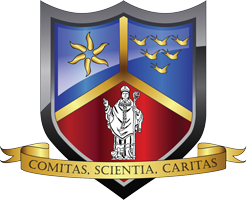Literacy
What is literacy and why is it important?
Literacy is the development of reading, writing and communication skills to support learning and academic achievement across all subjects. More importantly, higher levels of literacy skills enable pupils to function effectively in the demanding world outside of school, now and as adults.
Research shows the most important component of any attempt to raise literacy competency is to enhance the classroom context. It goes beyond the teaching of basic skills – the mechanics – to a consideration of how we all create opportunities for the use of literacy within a flexible and supportive teaching environment. This is what we strive for at St Richard’s.
Literacy is a tool for wider enquiry and understanding and without these skills, young people will be unable to accomplish academic goals and communicate effectively with one another.
What do we do to support the development of literacy skills?
Teachers in individual departments accept that they are all teachers of language. Each department has closely considered what the literacy requirements are for their area, the vocabulary specific to their subject, the range of texts used and the writing styles pupils will need to adopt to be successful.
We endeavour to support the particular challenge of developing expertise in non-fiction writing, including the knowledge of grammatical structures. The use of the college’s Literacy Box and Writing Toolkit supports pupils to be able to write consistently across subjects and adapt writing for purposes and audiences effectively. The college’s Word of the Day also helps pupils to develop a wider vocabulary as well as understanding meanings and derivations of new words. Teachers will assess pupils’ work to include spelling, punctuation and grammar elements and pupils are expected to address corrections/feedback with a purple pen in dedicated DIRT time.
The Personal Tutor is the link between school and home and plays a key role in promoting positive attitudes to reading among pupils. We encourage private reading and provide ‘book boxes’ of interesting reading material, including non-fiction material such as newspapers, and even comics, as a way of encouraging the reading habit that can then lead on to a wider range of reading material. Drop Everything And Read (DEAR) is adopted during registrations in the week. Personal Tutors also allow time for focused talk related to the pupils’ reading materials.
The college ethos encourages pupils to read and write beyond the curriculum requirements. We demonstrate how we value literacy, for example, by sharing good books, celebrating pupils’ written achievements in school assemblies and encouraging greater use of the school library. Pupils enjoy taking part in writing competitions and events and successes are acknowledged and promoted. Role models are provided particularly for boys, who can communicate the message that reading is important for life. We use displays and posters to encourage pupils to read. We invite, for example, poets, authors and illustrators to share their expertise and their love of their profession which stimulates and supports pupils’ writing. Pupils are encouraged to develop their reading in each subject area, for example, by recommendations of fiction with a historical theme.
Literacy Interventions at KS3 and KS4
The college’s literacy intervention supports many pupils to develop specific literacy skills that need more dedicated time than lessons solely allow. Pupils are selected for intervention based on their progress towards their target level and baseline data, such as reading and spelling ages and CATs levels. About 20% of pupils do not study a MFL and focus on literacy support instead. This time is used for the practice of exam skills in KS4.
In both Key Stages, some pupils have up to three timetabled Literacy lessons. These sessions will also allow for additional access to Word Shark and reading programmes. These computer programs are carefully monitored by the pupil’s English teacher.
All pupils’ reading ages are tested regularly and any pupil significantly below their chronological age will receive paired or group reading intervention twice a week. For some pupils this may include work on decoding and phonics which may have been missed in Primary school. Reading age progress is monitored three times a year using the digital reading test which tests sentence and passage comprehension. Spelling ages are also tested annually and pupils below the expected level will be entered onto the Word Shark spelling program, with the most needy receiving small group spelling intervention. Handwriting intervention is also provided on a termly basis and delivered by the Special Educational Needs department.


